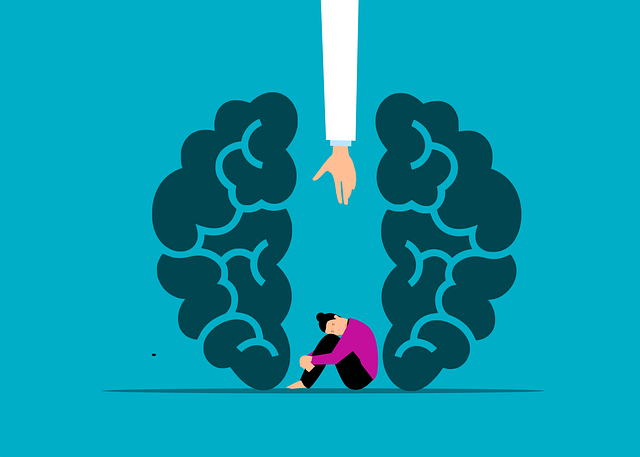Burnout among healthcare providers in Greenwood Village is a growing concern impacting well-being and patient care quality. Recognized by WHO as an occupational syndrome, burnout includes emotional exhaustion, depersonalization, and decreased personal accomplishment. Factors contributing to burnout include long work hours, high-stress environments, and lack of control. Mitigating burnout requires organizational change, emotional well-being techniques, and evidence-based interventions like CBT and mindfulness practices. Greenwood Village Relationship Issues Therapy offers specialized support, incorporating self-care and mindfulness strategies to prevent burnout, increase job satisfaction, and improve patient care.
Healthcare provider burnout is a growing concern, impacting not just individuals but the overall quality of patient care. This article explores comprehensive strategies to prevent burnout among healthcare workers. We delve into the root causes, recognizing signs like increased stress and decreased job satisfaction. Organizational changes, evidence-based interventions, and self-care techniques are discussed, offering practical guidance for healthcare professionals in Greenwood Village and beyond. By implementing these strategies, we aim to foster a healthier work environment, enhancing patient outcomes and provider well-being.
- Understanding Burnout Among Healthcare Providers: Recognizing the Signs and Causes
- Creating a Supportive Work Environment: Strategies for Organizational Change
- Evidence-Based Interventions for Burnout Reduction: Therapies and Techniques
- The Role of Self-Care and Mindfulness: Empowering Healthcare Professionals to Prevent Burnout
Understanding Burnout Among Healthcare Providers: Recognizing the Signs and Causes

Burnout among healthcare providers is a growing concern, impacting both individual well-being and patient care quality. It’s essential to recognize that burnout isn’t simply about job dissatisfaction; it involves emotional exhaustion, depersonalization, and decreased personal accomplishment—a syndrome recognized by the World Health Organization (WHO) as an occupational phenomenon. Healthcare professionals often face unique challenges, from long work hours to high-stress environments, which can lead to a range of issues, including relationship problems and mental health struggles.
The signs of burnout are multifaceted and may include increased irritability, cynicism towards patients or colleagues, feelings of detachment, and reduced job satisfaction. Causes are varied, with workload intensity, lack of control over work processes, insufficient rewards, and poor support from management playing significant roles. In the context of Greenwood Village, as a hub for healthcare services, understanding these dynamics is crucial. Promoting emotional well-being through techniques such as self-awareness exercises and mental health policy analysis and advocacy can help mitigate burnout.
Creating a Supportive Work Environment: Strategies for Organizational Change

In creating a supportive work environment, healthcare organizations can implement several strategies for organizational change that aim to mitigate burnout among providers. One key area is fostering open communication channels and promoting a culture of empathy and understanding. This involves regular check-ins with staff, encouraging feedback, and ensuring managers are accessible and attuned to their teams’ needs. Additionally, offering resources for Greenwood Village Relationship Issues Therapy can significantly help healthcare workers manage personal stressors that often impact professional well-being.
Integrating practices like Mood Management techniques, Self-Awareness Exercises, and Social Skills Training within the workplace can also contribute to a healthier atmosphere. These programs equip employees with valuable tools to handle stress, enhance emotional resilience, and improve interpersonal interactions. By prioritizing employee mental health and providing these evidence-based strategies, organizations can create a more supportive setting that nurtures professionals and reduces burnout risks.
Evidence-Based Interventions for Burnout Reduction: Therapies and Techniques

Burnout among healthcare providers is a growing concern, yet addressing it through evidence-based interventions can significantly mitigate its impact. Therapies and techniques such as Cognitive Behavioral Therapy (CBT) have proven effective in managing stress and improving emotional regulation. CBT helps professionals identify and change negative thought patterns that contribute to burnout, fostering healthier coping mechanisms for stressful situations. Additionally, mindfulness-based practices like meditation and yoga have been shown to reduce symptoms of anxiety and depression while enhancing overall mood management.
Greenwood Village Relationship Issues Therapy, a specialized service in the heart of Colorado, offers valuable support tailored to healthcare workers’ unique challenges. The Stress Management Workshops Organization provides engaging programs focused on emotional regulation techniques, promoting work-life balance. By incorporating these evidence-based interventions into their practices, healthcare facilities can create supportive environments that empower providers to manage stress effectively and maintain a positive mental state, ultimately preventing burnout.
The Role of Self-Care and Mindfulness: Empowering Healthcare Professionals to Prevent Burnout

In the high-pressure world of healthcare, where professionals consistently face demanding workloads and intense emotional demands, self-care and mindfulness practices are essential tools for burnout prevention. Healthcare providers, like those participating in Greenwood Village Relationship Issues Therapy, can benefit from integrating these strategies into their daily lives to maintain well-being and resilience. Self-care involves attending to one’s physical, mental, and emotional needs, ensuring a healthy work-life balance. This may include activities such as regular exercise, adequate sleep, engaging in hobbies, and spending quality time with loved ones—all of which contribute to stress reduction and improved overall health.
Mindfulness, on the other hand, encourages professionals to focus their attention on the present moment without judgment. Through practices like meditation, deep breathing exercises, or yoga, healthcare workers can enhance their self-awareness and develop a greater sense of calm amidst chaos. These techniques enable them to better manage stress, improve patient interactions, and foster more positive relationships within their professional communities. Incorporating self-care and mindfulness into daily routines may also inspire professionals to advocate for healthier work environments, including implementing community outreach programs that promote mental health awareness or suggesting the adoption of structured self-awareness exercises during staff meetings. By prioritizing these strategies, healthcare providers can prevent burnout, enhance job satisfaction, and ultimately provide better care for their patients.
Healthcare provider burnout is a complex issue that requires multifaceted solutions. By understanding the signs, causes, and implementing evidence-based interventions, organizations can create supportive work environments that foster resilience. Self-care and mindfulness practices empower healthcare professionals to prevent burnout, ensuring they can continue providing quality care. If you or someone you know is experiencing burnout, consider seeking support from a mental health professional, such as those at Greenwood Village Relationship Issues Therapy, to navigate these challenging times.











